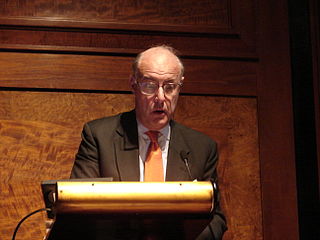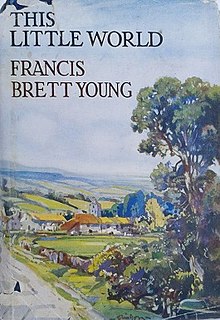
Andrew William Mellon, sometimes A. W. Mellon, was an American banker, businessman, industrialist, philanthropist, art collector, and politician. From the wealthy Mellon family of Pittsburgh, Pennsylvania, he established a vast business empire before moving into politics. He served as United States Secretary of the Treasury from March 9, 1921 to February 12, 1932, presiding over the boom years of the 1920s and the Wall Street crash of 1929. A conservative Republican, Mellon favored policies that reduced taxation and the national debt in the aftermath of World War I.

George Macaulay Trevelyan was a British historian and academic. He was a Fellow of Trinity College, Cambridge, from 1898 to 1903. He then spent more than twenty years as a full-time author. He returned to the University of Cambridge and was Regius Professor of History from 1927 to 1943. He served as Master of Trinity College from 1940 to 1951. In retirement, he was Chancellor of Durham University.

The Dictionary of National Biography (DNB) is a standard work of reference on notable figures from British history, published since 1885. The updated Oxford Dictionary of National Biography (ODNB) was published on 23 September 2004 in 60 volumes and online, with 50,113 biographical articles covering 54,922 lives.

The phrase "Middle England" is a socio-political term which generally refers to middle class or lower-middle class people in England who hold traditional conservative or right-wing views.

Sir David Nicholas Cannadine is a British author and historian who specialises in modern history, Britain and the history of business and philanthropy. He is currently the Dodge Professor of History at Princeton University, a visiting professor of history at Oxford University, and the editor of the Oxford Dictionary of National Biography. He has been the president of the British Academy since 2017, the UK's national academy for the humanities and social sciences. He also serves as the chairman of the trustees of the National Portrait Gallery in London and vice-chair of the editorial board of Past & Present.
Sir John (Jack) Harold Plumb was a British historian, known for his books on British 18th-century history. He wrote over thirty books.
The Institute of Historical Research (IHR) is a British educational organisation providing resources and training for historical researchers. It is part of the School of Advanced Study in the University of London and is located at Senate House. The institute was founded in 1921 by A. F. Pollard.

The Westminster St. George's by-election, 1931 was a parliamentary by-election held on 19 March 1931 for the British House of Commons constituency of Westminster St. George's.
Lord Randolph Churchill was a two-part biography written by Winston Churchill of his father, the Victorian politician Lord Randolph Churchill. It was first published in 1906.
Harold James Dyos (1921–1978) was a British historian, known for his contributions to urban history. He wrote many essays addressing the issue of urbanization.

Ornamentalism: How the British Saw Their Empire is a book by David Cannadine about British perceptions of the British Empire. Cannadine argues that class, rank and status were more important to the British Empire than race. The title of the work Ornamentalism is a direct reference to Edward Said's book Orientalism, which argues the existence of prejudiced outsider interpretations of the East, shaped by the attitudes of European imperialism in the 18th and 19th centuries. It has also been argued to borrow tones from the title of Joseph Schumpeter's "Imperialism and Social Classes", which some historians see as the origins of the 'Ornamentalist' perspective in academic history'.

Winston Churchill was introduced to painting during a family holiday in June 1915, when his political career was at a low ebb. He continued this hobby into his old age, painting over 500 pictures of subjects such as his goldfish pond at Chartwell and the landscapes and buildings of Marrakesh. He sold some works, but he also gave away many of the works that he self-deprecatingly described as "daubs" as gifts.
The Great Depression of British Agriculture occurred during the late nineteenth century and is usually dated from 1873 to 1896. Contemporaneous with the global Long Depression, Britain's agricultural depression was caused by the dramatic fall in grain prices that followed the opening up of the American prairies to cultivation in the 1870s and the advent of cheap transportation with the rise of steamships. British agriculture did not recover from this depression until after the Second World War. Other countries in Western Europe such as the Netherlands experienced the same agricultural crisis (1878–1895) as a result of the market being flooded by cheap grain from the United States and Canada.

Victorious Century: The United Kingdom, 1800–1906 is a book by David Cannadine, the Dodge Professor of History at Princeton University and President of the British Academy. The book is about the Victorian era in nineteenth-century Britain. It begins with the Act of Union in 1800 and ends with the Parliamentary victory of the Liberal Party in 1906. Cannadine opens with the Charles Dickens' quote, "It was the best of times, it was the worst of times." He argues that Britain maintained its status as leader of the global economy and possessor of the largest navy in the world. At the same time, the country was plagued by internal problems and social conflicts. According to the Whig Interpretation of history, the "victorious century" represented a time of expanding democracy and wave of Parliamentary acts providing political reform and universal manhood suffrage. Cannadine argues,
"This was a country which saw itself at the summit of the world. And yet it was a society also convulsed by doubt, fear and introspection. Repeatedly, politicians and writers felt themselves to be staring into the abyss and what is seen as an era of irritating self-belief was in practice obsessed by a sense of its own fragility, whether as a great power or as a moral force. Victorious Century catches the relish and humour of the age, but also the dilemmas of a kind with which we remain familiar today."
The Penguin History of Britain is a popular book series on British history, published by Penguin Books. It appeared in nine volumes between 1996 and 2018, with many of the individual works subsequently being republished in several editions. Its general editor is David Cannadine, who also contributed a volume himself. Collectively, the books in the series span the period 54 BC to 1990 and include:

My Brother Jonathan is a 1928 novel by the British writer Francis Brett Young. It portrays the life of an idealistic young doctor working in the Black Country before the First World War, forced to deal with the consequences of his irresponsible brother Harold.

The House Under the Water is a 1932 novel by the British writer Francis Brett Young. It is one of his "Mercian novels", set in the West Midlands and Welsh borders.

White Ladies is a 1935 novel by the British writer Francis Brett Young. The granddaughter of a wealthy tycoon and his well-bred wife becomes obsessed with recovering the family estate, the Elizabethan manor house named White Ladies. Like many of the author's Mercian novels, much of the novel is set in Worcestershire.

Portrait of Clare is a 1927 novel by the British writer Francis Brett Young. A commercial success, it also won the James Tait Black Memorial Prize.













